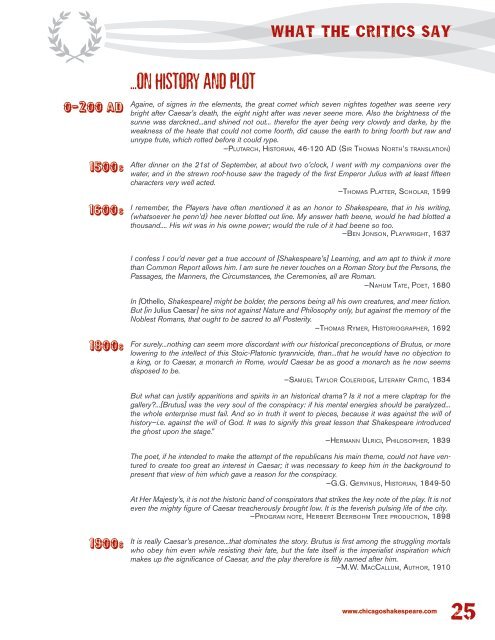Julius Caesar • 2013 - Chicago Shakespeare Theater
Julius Caesar • 2013 - Chicago Shakespeare Theater
Julius Caesar • 2013 - Chicago Shakespeare Theater
You also want an ePaper? Increase the reach of your titles
YUMPU automatically turns print PDFs into web optimized ePapers that Google loves.
0-200 ad<br />
1500s<br />
1600s<br />
1800s<br />
1900s<br />
...ON HISTORY AND PLOT<br />
WHAT THE CRITICS SAY<br />
Againe, of signes in the elements, the great comet which seven nightes together was seene very<br />
bright after <strong>Caesar</strong>’s death, the eight night after was never seene more. Also the brightness of the<br />
sunne was darckned...and shined not out... therefor the ayer being very clowdy and darke, by the<br />
weakness of the heate that could not come foorth, did cause the earth to bring foorth but raw and<br />
unrype frute, which rotted before it could rype.<br />
—pluTarCh, hisTorian, 46-120 aD (sir Thomas norTh’s TranslaTion)<br />
After dinner on the 21st of September, at about two o’clock, I went with my companions over the<br />
water, and in the strewn roof-house saw the tragedy of the first Emperor <strong>Julius</strong> with at least fifteen<br />
characters very well acted.<br />
—Thomas plaTTer, sCholar, 1599<br />
I remember, the Players have often mentioned it as an honor to <strong>Shakespeare</strong>, that in his writing,<br />
(whatsoever he penn’d) hee never blotted out line. My answer hath beene, would he had blotted a<br />
thousand.... His wit was in his owne power; would the rule of it had beene so too.<br />
—Ben Jonson, playWriGhT, 1637<br />
I confess I cou’d never get a true account of [<strong>Shakespeare</strong>’s] Learning, and am apt to think it more<br />
than Common Report allows him. I am sure he never touches on a Roman Story but the Persons, the<br />
Passages, the Manners, the Circumstances, the Ceremonies, all are Roman.<br />
—nahum TaTe, poeT, 1680<br />
In [Othello, <strong>Shakespeare</strong>] might be bolder, the persons being all his own creatures, and meer fiction.<br />
But [in <strong>Julius</strong> <strong>Caesar</strong>] he sins not against Nature and Philosophy only, but against the memory of the<br />
Noblest Romans, that ought to be sacred to all Posterity.<br />
—Thomas rymer, hisTorioGrapher, 1692<br />
For surely...nothing can seem more discordant with our historical preconceptions of Brutus, or more<br />
lowering to the intellect of this Stoic-Platonic tyrannicide, than...that he would have no objection to<br />
a king, or to <strong>Caesar</strong>, a monarch in Rome, would <strong>Caesar</strong> be as good a monarch as he now seems<br />
disposed to be.<br />
—samuel Taylor ColeriDGe, liTerary CriTiC, 1834<br />
But what can justify apparitions and spirits in an historical drama? Is it not a mere claptrap for the<br />
gallery?...[Brutus] was the very soul of the conspiracy: if his mental energies should be paralyzed...<br />
the whole enterprise must fail. And so in truth it went to pieces, because it was against the will of<br />
history—i.e. against the will of God. It was to signify this great lesson that <strong>Shakespeare</strong> introduced<br />
the ghost upon the stage.”<br />
—hermann ulriCi, philosopher, 1839<br />
The poet, if he intended to make the attempt of the republicans his main theme, could not have ventured<br />
to create too great an interest in <strong>Caesar</strong>; it was necessary to keep him in the background to<br />
present that view of him which gave a reason for the conspiracy.<br />
—G.G. Gervinus, hisTorian, 1849-50<br />
At Her Majesty’s, it is not the historic band of conspirators that strikes the key note of the play. It is not<br />
even the mighty figure of <strong>Caesar</strong> treacherously brought low. It is the feverish pulsing life of the city.<br />
—proGram noTe, herBerT BeerBohm Tree proDuCTion, 1898<br />
It is really <strong>Caesar</strong>’s presence...that dominates the story. Brutus is first among the struggling mortals<br />
who obey him even while resisting their fate, but the fate itself is the imperialist inspiration which<br />
makes up the significance of <strong>Caesar</strong>, and the play therefore is fitly named after him.<br />
—m.W. maCCallum, auThor, 1910<br />
www chicagoshakespeare com 25




